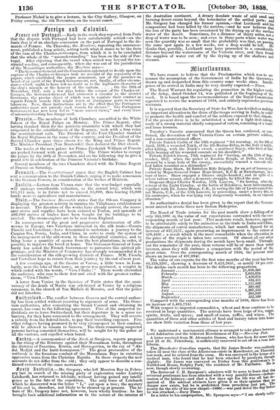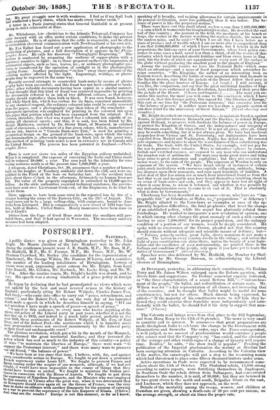311tottlInurnun.
We have reason to believe that the Proclamation which was to ae_ nounce the assumption ot the Government of India by the Queenss-a s drawn up and despatched from this country some weeks since. Intelli- gence of its arrival in India may be very shortly expected.—Times.
The Royal Warrant for regulating the promotion in the higher ranks of the Army, dated October 14, was published at the beginning of the week. It is based upon the recommendations sof the Royal Commission appointed to revive the warrant of 1854, and entirely supersedes previous warrants.
It is reported that the Secretary of State for War, has decided on making an important alteration in the dress of the troops serving in India, in order to promote the health and comfort of the soldiers exposed to that climate. For the present dress is to be substituted a suit of a light drab colour, made of a strong material chiefly composed of cotton, consisting of a tunic and loose trousers.
Tuesday's Gazette announced that the Queen has conferred, or con- firmed, the decoration of the Victoria Cross on certain private soldiers, and a non-commissioned officer.
Private Patrick Carlin of the 13th regiment "for rescuing, on the 6th of April, 1858, a wounded Naick, of the 4th Madras Rifles, in the field of battle, alter killing, with the Naick's sword, a mutineer Sepoy, who fired at him while bearing off his wounded comrade on his shoulders." Private Patrick Green, 75th regiment for "having, on the 11th of Sep- tember, 1857, when the picket at Koodsia Baugh, at Delhi, was hotly pressed by a large body of the enemy, successfully rescued a comrade who had fallen wounded as a skirmisher."
Private Same Shaw, 3d Battalion Rifle Brigade, for an act of bravery re- corded by Major-General James Hope Grant, K.C.B. at Nawabgunge, in a tope of trees. Shaw engaged a Ghazee single-handed; and in spite of a severe tulwar wound, after a desperate struggle, he killed the man.
Sergeant-Major ant-Major Charles Wooden, 17th Lancers, "for hosing, after the retreat of the Light Cavalry, at the battle of Balaklava, been instrumental, together with Dr. James Mouat, C.B., in saving the life of Lieutenant-Colo- nel Morris, C.B., of the 17th Lancers, by proceeding, under a heavy fire, to his assistance, when he was lying very dangerously wounded, in an exposed situation."
An authoritative denial has been given to the report that the Govern- ment intend to create three new Indian Bishoprics.
The Board of' Trade returns for the past month show a falling-off of only 355,109/. in the value of our exportations contrasted with the cor- responding month of last year. This moderate result, however, appears to be attributable solely to the animation in the trade to India and China, the shipments of cotton manufactures, which last month figured for an increase of 427,217/., again presenting an improvement to the extent of 408,4631.; a result which is the more remarkable when the alteration in the price of the staple is taken into account. Of almost all our other productions the shipments during the month have been small. Through- out the remainder of the year, these returns will be of more than usual interest, since they will embrace a comparison with the period of the great crisis. Over the corresponding month of 1856, the present total shows an increase of 497,094/. The value of our exports for the first nine months of the year has been 86,310,3291., showing a decrease of 9,425,2631., or nearly 10 per cent.
The decline each month has been in the following proportions. £1,836,505 2,024,624 1,456,074 534,411 1,117,556 389,407 1,207,535 504,042 355.109 January February. March April May June July August September Compared with the corresponding nine months of 1856, there has been an increase of 1,403,724/. With respect to imported commodities, wheat and flour continue to be received in large quantities. The arrivals have been large of tea, suer, spirits, fruits, and spices; and small of cocoa, coffee, and wines. The quantities of these and other articles of food and luxury taken into home use show little variation from those of last year.
We understand a matrimonial alliance is arranged to take place between Lord Ashburton and the widowed alarchioness of 'V.—Morning Post.
A letter received from M. Alexandre Dumas, who has been for some time pest ill at St. Petersburg, is sufficiently recovered to set off on a tour into biberia.
The Manchester Guardian reports, that Sir James Brooke was suddenly taken ill near the close of the Athenamm eoirie in Manchester, on Thursday last week, and he retired from the room. He was conveyed to the house of a medical man, who found that he had been attacked by paralysis, though slightly. Sir James was conveyed on Friday from this gentleman's to Northwood House, Sedgley Park, the residence of Mr. Fairbairn. lieiS now, though slowly recovering. The Reverend C. H. Spurgeon's admirers will be sorry to learn that the reverend gentleman has been attacked with a very painful disease—inflam- mation of the kidneys—and that a few days ago his life was all bat de- spaired of. His medical advisers have given it as their opinion that no danger now exists, but he is prohibited from preaching just yet. The money for the site of his new chapel-54001.—was paid down the day before he was attacked.—Bury Titnes. In a letter to his congregation, Mr. Spurgeon says—" I am slowly tall My great struggle now is with weakness. I feel as if my frail bark Is-11 weathered a heavy storm, which has made every timber creak."
A letter in a Paris journal states that General Garibaldi is at present Hying in strict retirement at Nice.
Mr. Whitehouse, late electrician to the Atlantic Telegraph Company has (Noe forward with an offer, under certain conditions, to make the present cable available. He is of opinion that the cable is reasonable, and he offers to reatablish electrical communication with Newfoundland at his own risk. Mr. Fox Talbot has found out a new application of photography to the productiofl of pictures, and a full description of it appears in the Photo- graphic News. He calls his discovery " Photoglyptic Engraving." The -process is conducted by preparing the surfaces of copper-plates with a substance sensitive to light ; on to those prepared surfaces the impression of substantial objects, such as lace, leaves, Sce., or ordinary photographic pic- tures, is transferred by the operation of sunlight as in the photographic copying frame. Another preparation " etches ' away those portions of the covering matter affected by the light. Engravings, writings, or photo- graphs may be engraved in the same way. Recently several attempts to counterfeit bank-notes by means of photo- graphy have been successful; and this fraud has not been confined to bank- notes; other valuable documents having been copied in a similar manner. ft was thought that this kind of fraud was rendered impossible by printing the documents referred to in ink of two different colours, so that photo- graphy should reproduce them both in black. It was soon found, however, that while black ink, which has carbon for its basis, remained unassailable by any chemical reagent, the ordinary coloured inks could be easily removed from the paper, and a photographic copy then taken of the remainder. A subsequent operation was employed for printing in the coloured ink upon this paper that portion which had been expunged from the original. It is obvious' therefore, that what was wanted was a coloured ink capable of re- sisting all chemical agents ; and this, it is said, has been found by Mr. George Matthews, assisted by Dr. Sterry Hunt, of Montreal, in calcined oxide of chromium, a substance of a fine green colour, which, manufactured into an ink, known as "Canada Bank-note Tint," is used for printing a geometrical design on the ground of the bank-note, upon which the value and denomination is afterwards impressed in black ink in the usual way. This method of printing bank-notes is now in extensive use in Canada and the United States. The process has been patented in England.—Photo- graphic News.
There is now not above ten miles of the Egyptian railway unfinished. When it is completed, the expense of conveying the India and China mails will be reduced 20,000/. a year. The sum paid by the Admiralty for con- veying seaborne mails is at the present time 1,040,9401. a year.
A telegram, dated Christiana, Oct. 20, announces that a number of houses built on the heights at Tonsberg suddenly slid down the cliff, and were en- gulphed in the Fiord at the base on Saturday last. As the accident took lace about three o'clock in the afternoon, fortunately no human lives are lost. The value of the property engulphed is estimated in 12,000 species dollars. As the civic authorities required technical assistance, the govern- ment have sent over Lieutenant Groutved, of the Engineers, to do what he can for them.
There appears to have been some error in the reported loss by fire of a steamer bearing the name of the Eastern City, on the 24th of August. The vessel turns out to be a large sailing-ship, with emigrants, bound to Aus- tralia from Liverpool. She is comparatively a new vessel of 1222 tons bur- den, built at Boston, United States. Heavy insurances have been done on her at Lloyd's Advises from the Cape of Good Hope state that the smallpox still pre- vailed there, and that it had spread to Worcester. The necessary sanitary measures had been adopted.



























 Previous page
Previous page